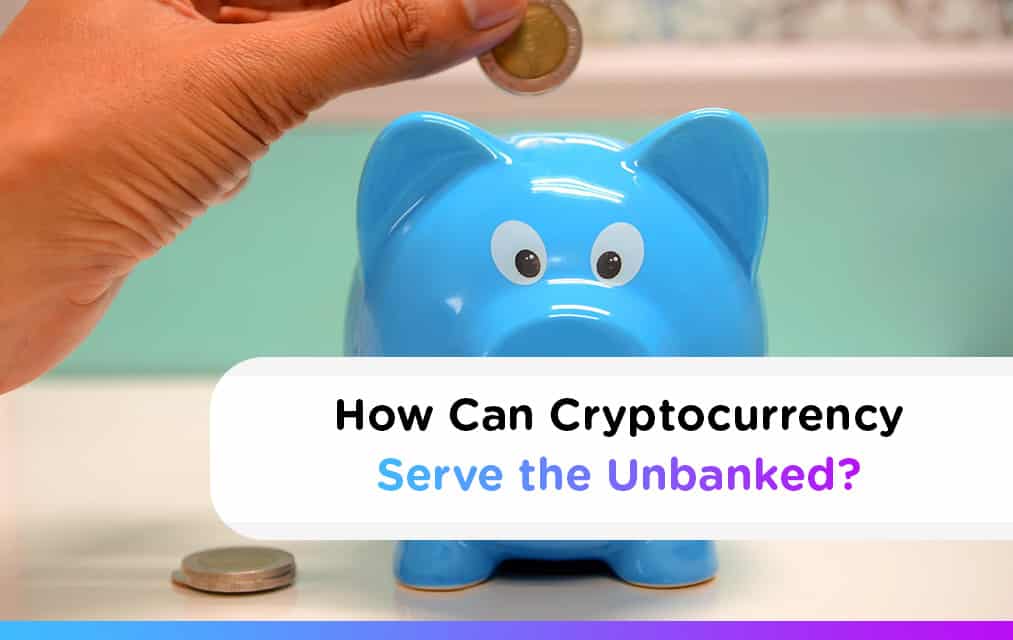Cryptocurrency can be used by just about anyone. That has caused cryptocurrency enthusiasts to hail it as an equalizer. Whether you’re already wealthy, in the middle class, in Asia, or in North America, cryptocurrency can be, more or less, used by all. As a result, cryptocurrency generated a lot of buzz regarding its potential to serve the unbanked.
Being unbanked in today’s world can mean a more difficult life, especially if you happen to be from a low-income household. So the question is: Just how effectively can cryptocurrency serve the unbanked? What causes people to become a part of the unbanked, and how can cryptocurrency address their needs?
Who are the Unbanked?
The unbanked refers to individuals who have no access to a bank or a similar type of financial institution. Globally, more than 1.6 million people are a part of the unbanked. In America, the number of unbanked households totals 7.1 million.
The inconveniences of being a member of the unbanked aren’t merely limited to not having access to a debit card. There are plenty of places around the world where cash is still king. The real danger of being unbanked is that this means having no real way to invest their money into a savings account. They have nowhere to securely hold earnings, and no access to products like loans or mortgages. This puts many members of the unbanked in a state of financial instability, and more tragically, it keeps them in that state.
So what puts these people in this situation in the first place?
Lack of Income

A survey done by the Federal Deposit Insurance Corporation (FDIC) found that 48.9% of the unbanked are unable to meet minimum balance requirements. As a result, they are unable to open a traditional bank account. This means that the unbanked segment of the population skews disproportionally towards minorities, low-income households, young households, and unemployed households.
It’s incredibly difficult to climb out of financial poverty when you’re both unbanked and have low income. Being unbanked means they cannot open a savings account to passively gather interest. They cannot apply for loans to invest in their own education or to open a business. It becomes incredibly difficult to gain access to financial support from government agencies. To make things worse, some banks are beginning to remove their branches from low-income neighborhoods, further compounding the problem.
Issues with Banking Fees
The same FDIC survey found that about a third of the unbanked fear high bank fees. Another third fear the unpredictability of bank fees. In 2011 alone, Americans ended up paying about $38 billion just in overdraft fees. The issue is so pressing, in fact, that unbanked households will sometimes use prepaid cards, rather than opening an account. While prepaid cards are sometimes subject to fees, the fees tend to be easier to calculate and predict.
This ties into issues regarding transparency in the banking system. Unbanked individuals cited problems with understanding how and when banks charge their fees. This lack of understanding became a reason to not joining the banking system. In fact, a study done by the Pew Health Group found that a bank’s account disclosure statement averaged anywhere between 21 to 153 pages—far from a quick and easy read.
For those who have a low income and cannot afford to make a mistake with the income they do have, this unpredictability makes it difficult to justify opening a bank account.
Distrust of the Banking System

News of bank scandals, fraud, and corruption are other reasons that the unbanked may choose to stay unbanked. The case of Wells Fargo pushing their employees to commit fraud to meet their sales goals is just one of these stories. HSBC, which has branches throughout much of the world, has also been accused of turning a blind eye to illegally acquired funds circulating through their system. For the unbanked, examples and stories like these are just another reason not to trust the banking system.
The racial inequality faced by those who use a traditional bank is another pressing issue. In America, banks introduced a notorious practice called “redlining” in the 1930s, making it difficult for members of the black community to get loans. Unfortunately, redlining caused a distrust towards banks, and the distrust is still present.
In the black community today, about 35% of families fear being denied loans or were outright denied loans. It’s no wonder that a disproportionate percentage of the unbanked includes African-Americans and other minorities. To make matters worse, banks have little financial incentive to solve this issue.
How Can Cryptocurrency Help?
It’s clear that the unbanked face issues that the traditional banking system is currently unable to tackle. The banking system is not yet equipped to help those in low-income households, and the corrupt history of the banking system has given the unbanked many reasons to distrust it. Cryptocurrency, on the other hand, can help solve these issues.
No Minimum Balance
Unlike a traditional bank account, there is no minimum balance required to begin using cryptocurrency. Anyone with a cell phone and Internet connection can electronically send and receive cryptocurrency. This means it has a relatively low barrier to entry. With 85% of Americans owning a smartphone, and with the cost of owning a smartphone lowering as the market becomes increasingly saturated, this makes cryptocurrency a viable alternative to traditional banks.
Extreme Accessibility

Cryptocurrency lets the unbanked catch up with the rest of the population in another huge way: they now have electronic access to their funds. This makes it easier for the unbanked to quickly access their funds anytime and anywhere.
Why is this important? Those who are from low-income families may not have the luxury of going to the bank during regular bank hours. The unbanked may be working multiple jobs. They may be working in industries that require them to work long hours. They may not have access to a personal vehicle, making it difficult to go to a bank that’s outside of their community. For these members of the unbanked, 24/7 access to their cryptocurrency funds is an absolute boon.
Cryptocurrency Looks Past Identity
Cryptocurrency can be a viable option for those who face racial discrimination and class bias from the banking system. Unlike traditional banks, a worker doesn’t need to approve you to open an account. With everything done online, anyone can open a cryptocurrency account. In fact, high-income, well-educated men are more likely to be buying cryptocurrencies like Bitcoin, but more and more minorities invest now too. About 23% of Bitcoin investors are of African-American or Hispanic descent—and more are looking to join.
Decentralization
Using cryptocurrency allows the unbanked to bypass traditional banks, enabling the anonymous peer-to-peer exchange of funds. The decentralized nature of cryptocurrency allows users to have a high degree of control over their own finances. This may be especially appealing for those who distrust the banking system.
Decentralization also makes it easier for owners of high-risk businesses to remain in operation. This includes industries like the cannabis industry, gambling industry, and, more importantly for the unbanked, startups. Since cryptocurrency eliminates the need for third-party payment processors, cryptocurrency can be a viable way for members of the unbanked to gain the funds they need for a startup. As a result, members of the unbanked with low income can begin climbing out of the cycle of poverty.
Security and Increased Control
Banks are constantly facing cyberattacks. While banking institutions constantly invest in cybersecurity, its implementation varies wildly across institutions. In fact, bigger and more well-known banks may not always have better security than a relatively smaller bank. Members of the unbanked already distrust the banking system, so the fear of cybercriminals exploiting holes in a bank’s cybersecurity setup is a very real one.
By using cryptocurrency, members of the unbanked can take security into their own hands. Cryptocurrency can be kept in both online and offline wallets, with the majority being stored in an offline wallet for later use. This acts much like a secure checking account. Strong passwords give users additional protection. Users should also be sure to use a reputable crypto-exchange if they plan on converting their funds to fiat money.
The main point here is that the security of their funds is back in the control of the unbanked. The unbanked can pick and choose their methods of securing their cryptocurrency, and can implement new security measures much more quickly than a traditional financial institution. While this does mean that cryptocurrency users take on a measure of risk, the trade-off may well be worth it.
Increased Transparency

The use of blockchain technology in the world of cryptocurrency increases transparency, which the unbanked are failing to find in traditional banking systems. Blockchain technology ensures that all transactions ever made by a specific cryptocurrency are recorded in a database. If anyone tampers with this database, the transactions are cross-referenced with each other to prevent any tampering.
Not only does this make cryptocurrency harder to hack, but this increased transparency can be extremely appealing to those of the unbanked who distrust traditional banking systems. While fraud can certainly still happen—no system is completely unbreakable, after all—blockchain technology makes it harder to muddle records and alter information.
Option to Invest
Last but not least, almost anyone can invest in cryptocurrency. They have full control over their own investments. For the unbanked, not having a traditional bank account severely limits the number of ways they can invest their money to secure their financial future. For those with no bank accounts, investments like stocks, mutual funds, and bonds are likely out of reach.
Of course, investing in cryptocurrency doesn’t ensure that you’ll get rich quick, or at all. Just like any investment, cryptocurrency involves taking risks. Education and increased financial literacy will mitigate these risks.
Cryptocurrency Can Help the Unbanked

For the unbanked, the traditional banking system has failed them due to high barriers of entry. The unbanked may lack the minimum amount needed to open an account. Banks themselves lack transparency. Coupled with the unbank’s mistrust of the banking system, many of the unbanked remained unbanked, and live in a state of financial instability.
In light of this, cryptocurrency may have a way to serve the unbanked. Cryptocurrency does not require users to have a minimum balance, the barriers to entry are low, and there are a variety of ways for users to take control of their own finances.
The Need for Better Cryptocurrency Education
Despite the advantages of cryptocurrency, much of cryptocurrency’s potential remains untapped. There are cases of entrepreneurs putting their hopes on cryptocurrency—for example, Akon announced plans to create a city in Senegal that runs entirely off of cryptocurrency—but for ordinary people, the widespread use of cryptocurrency still seems a long way off.
Many of these issues stem from the lack of education regarding cryptocurrency, and the lack of financial literacy in general. In fact, a whopping two-thirds of Americans are unable to pass a basic financial literacy test. Where the current system is failing, however, is where cryptocurrency can pick up the slack.
At the moment, jargon and the newness of the technology make cryptocurrency hard for the general public to understand. Currently, one of its biggest barriers to acceptance is due to lack of education in government.
To make up for this, education surrounding cryptocurrency needs to be more widespread, and it needs to specifically target the unbanked. If information regarding cryptocurrency can be tailored towards the unbanked, the chances of them buying into cryptocurrency will increase exponentially.
To keep yourself educated on cryptocurrency, be sure to check out our other articles.





